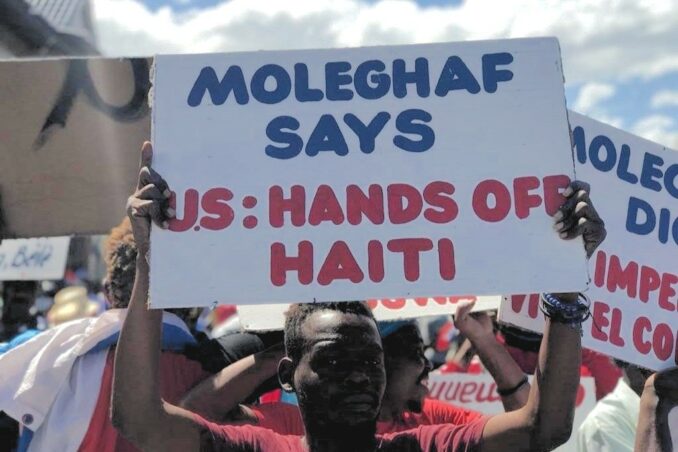Haiti, Kenya and imperialist maneuvering
Bulletin: According to an Oct. 9 comment from the Communist Party of Kenya on X, a “Nairobi Court has temporarily halted the planned deployment of police officers to Haiti,” calling this ruling “a significant step in ensuring justice.”
About half of all Haitians don’t get enough food on a daily basis. A quarter of all Haitian children are chronically malnourished.
While Haitian farmers have moved toward more community organization to stop this hunger, U.S. imperialism has intervened by persuading the Kenyan government to send military troops to Haiti.
Haitian farmers in northeast Haiti decided to do something to increase the availability of food. They called for a “konbit” — a Haitian institution for farmers to get together to supply labor for whatever the community needs — to build an irrigation canal using the waters of the Massacre River. More water means bigger crops and more food.
The Dominican Republic controls the 11 irrigation canals using the Massacre River, which marks the border between the DR and Haiti. The Massacre River was the center of a massacre of 35,000 Haitians carried out by the then-DR dictator Rafael Trujillo in 1937. Haitians are acting on their right to build one for use in Haiti.
Luis Abinader, the Dominican president, decided to close the border, deport tens of thousands of Haitian workers, or dark skinned Dominicans, and put a separate employee on every bus to check the legal status of anyone perceived to be Haitian until the Haitians stopped their construction.
Haitians living all over the world — Germany, France, Mexico, the United States — have set up GoFundMe pages to finance this “konbit”. Jean-Claude Dorisma, from the Mouvman Dezyèm Endepandans, set up one in Germany. He explained: “We’ve embarked on a mission to build a canal that will change lives in Ouanaminthe, Haiti. This canal is a lifeline for the community, a source of hope, and a step towards self-sufficiency in food.”
He went on to say: “We refuse to let our fellow Haitians bear this burden alone. We are rallying together to provide the materials and support needed to advance the construction of this vital canal.” (gofundme.com)
Imperialists plan military occupation
The U.S. and European big business media have been portraying the major problem of Haiti as the fallout among anti-social gangs that are engaged in extortion, kidnapping, robbery and general lawlessness. They also point out that no Haitian leader has been elected because elections haven’t been held. They certainly avoid pointing to the multiple ways the U.S. and its European allies, with their major imperialist interests in the Caribbean, have contributed to Haiti’s problems.
The instability is indeed a major problem for the Haitian people. After the assassination of President Jovenel Moïse in 2021, tens of thousands of people have had to flee their homes in the absence of any kind of protection.
Still, Haitians made it clear that they were totally opposed to an occupation by U.N. forces. From 2004 to 2017, the U.N. had a major military mission in Haiti called the United Nations Stabilization Mission in Haiti, which cost over $7 billion and brought cholera to Haiti — twice. The opposition to a U.S.-led occupation force is even stronger. There are rumors, coming from a former special forces operative, that the U.S. has a few hundred special force troops currently operating underground in Haiti.

Haitians know they don’t want the U.S. or its flunkeys policing them.
Those directing U.S. foreign policy have been looking for a regime in some country that would be willing to use its armed forces to try to lead a military/police intervention in Haiti. They finally managed to get the government of Kenya, an East African country of 55 million people, to take the lead.
Earlier, U.S. Defense Secretary Lloyd Austin had signed a five-year deal with Kenya’s Defense Minister, Aden Duale, in which Washington supplies money, weapons, and training to the East African country to work as a U.S. proxy in Africa and Latin America.
The U.S. has pledged $200 million for the current operation led by Kenya in Haiti.
Support for this deal inside Kenya is far from unanimous, as this statement issued at the end of September made clear: “The Communist Party of Kenya demands that the Kenya Kwanza government rescind their proposal to send 1,000 police to Haiti, while calling on the Kenyan people to join the Haitian masses and popular progressive forces worldwide in opposing the intervention, continued occupation and neo-colonial governance of Haiti by the Core Group and the U.N.”
The official Kenyan opposition party also appears to be opposed to this move.

